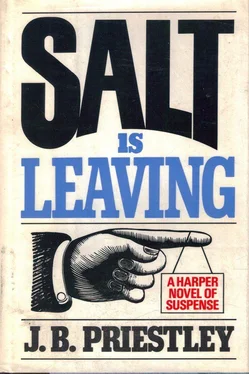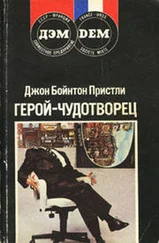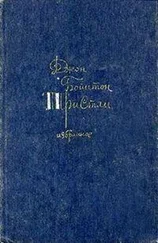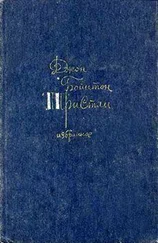When they were in his car and moving off, Maggie said to him: "I know you don't like talking when you"re driving, but perhaps you don't mind listening. I want to explain about Alan. He's not really against you. The point is, he's just come from his University and lecture room and physics lab, and he's suddenly plunged into all this – and so far he hasn't – sort of – absorbed any of the atmosphere. He's still in his particular world where you don't expect anything strange to happen to anybody."
"Except the H-Bomb," Dr Salt muttered.
"I know. I've argued with Alan and some of his friends about that. There's a kind of innocence about them in some ways. Perhaps because they've always been in school or college, never where people are thinking about money all the time. He often makes me feel years older than he is."
Dr Salt made a grunting noise. Apparently he didn't care how old any of the Culworths were.
"Actually, Alan's four years older."
This time he didn't even grunt. Not interested.
"And, anyhow, I can't altogether blame Alan," she went on, determined now to make him show some interest. "You know, Dr Salt, you do pile it on a bit. Every time you say Noreen Wilks , you make it sound as if you thought she'd been murdered."
"Do I? Sorry!"
"Oh – I know you don't mean to. Why would anybody-"
"I'm driving," he cut in ruthlessly.
Furious with him, and feeling compelled to do something, she looked back to see if Alan was following them. He was. Then she stared ahead at the darkening streets of Birkden, almost expecting them to begin looking quite different. But they refused to look sinister and mysterious. Birkden wore the same face it had worn when she had come in by bus a few hours ago – only a few hours, though now she felt as if she had spent days with Dr Salt.
2
They were passing semi-detached villas and larger houses in their own grounds, softening the edge of town and country. Soon they were moving alongside the vast bulk of the United Fabrics works – she remembered then that the firm had moved almost into the country some years ago – and at the imposing entrance Dr Salt stopped to ask a man on duty there the way to the Club. His directions took them up a road that might still have been almost a country lane. They turned into a drive and parked in a wide space, where there were only a few other cars, not far from a lighted doorway.
"Now what?" said Alan rather grumpily as he joined them.
"We go in," Dr Salt told him. "I can do the talking."
"It doesn't look very busy," said Maggie.
"Early yet," Dr Salt said. "Anyhow, it may be one of their quiet nights. And so much the better."
He led the way in. There was no porter just inside the door – Maggie had expected one because she had been to several mixed clubs with Hugh – but there was a place where a porter ought to have been, so perhaps he wasn't on duty yet. Dr Salt did not hesitate, but went forward and opened a door into soft lights and soft music. It was a cocktail bar, charmingly lit, and decorated and furnished in an unfussy modern style, rather Scandinavian. There was plenty of space in front of the curved bar counter, where the white-coated barman and his array of bottles took most of the light, but all round the walls were low tables and rather low chairs and banquettes, variously upholstered in what were probably the most magnificent specimens of United Fabrics" fabrics. Nobody was sitting at the tables, but three people, two smart young men and an even smarter girl, were standing at the bar. The muted violins, the melancholy clarinets, that had been taped somewhere in New York or Los Angeles, went on and on, as they did now all over the world, saying that life and love were rather sweet, but that nothing really mattered very much. Maggie thought she heard Dr Salt muttering curses on them.
Now the three at the bar could be overheard. One of the young men was saying that somebody was projecting the wrong image.
"You and your images!" cried the girl wearily. "Do you mind?"
"Come off it, ducky. As if you didn't know what it was all about."
"Do I? Since when?"
"Since you were about fifteen, I'd say."
"And you'd be quite wrong, Alec." This was the second man. "But where the hell's Kate?"
"Don't say I didn't warn you," said the girl. "Every time she starts doing her face, she begins thinking about something else."
"Do we know what?"
"As a matter of fact, you don"t," the girl told him. "Because even I don"t."
"Let's go in, then," said Alec. "George, if a Miss Tiller asks for me, tell her we've gone in. I've already signed for her." The three were now moving slowly towards a door on the left of the bar. "They"re very sticky about that, here."
"And quite right too," said the other young man. "God knows what would be blowing in!"
Maggie knew very well that this was not aimed at her and her two men. The young man had never noticed them. But the remark did not make her feel any better. In these surroundings, still wearing her shop clothes, and after taking one look at that girl, she felt small, shabby, dreary. As Dr Salt went slowly towards the bar counter, she sat on the edge of the nearest chair, beckoning to Alan to sit down. But he persisted in leaning against the wall, just inside the doorway, and in glaring at nothing in particular, feeling – as she knew without any doubt – a perfect fool. That was simply because he knew he had no right to be there and might be ordered out at any moment. But the whole snooty place wasn't telling him that his face and hair were wrong, his clothes and shoes wrong, that he was just a miserable little drear; which was what it had been busy doing to her. She now watched and listened to Dr Salt, who was leaning against the bar counter and had been lighting his pipe. He might be – indeed, he obviously was – a maddening man, but there was one thing about him – he didn't seem to care a damn.
"My name's Salt," he told the barman very carefully. "Dr Salt."
"Oh yes." The barman was fairly young and had a crew cut; his face seemed wider across the jaw than across the forehead. Maggie had been against him from the first glance.
"Are you Tony?" asked Dr Salt.
"No. Tony's not here any longer."
"Oh – what a pity!"
"Most people don't think so. I took his place."
"I see." Dr Salt sounded vague and rather stupid. "Though I don't really know Tony. He was mentioned to me by a friend of mine."
"Is that so? Well, I don't think you"re a member, are you?"
"Oh – no, not at all." Dr Salt gave a little laugh that Maggie had never heard before and instantly disbelieved in. "Though I don't know why I said not at all , because either one would be a member or not a member – one could hardly be partly a member. No, I'm not."
"I got it the first time. Well, I can't serve you a drink unless you"re a member."
"I don't want a drink."
"What do you want, then? And are those two with you?"
"Yes, friends of mine. Miss Culworth. And Dr Culworth – of the University of Hemtonshire." Dr Salt sounded idiotic. "They"re just waiting for me. And I'd like to speak to your manager – Mr Dews, isn't it?"
"Yes. Does he know you?"
"I'm afraid not. Hardly anybody knows me."
"I doubt if he'll see you."
"One of us could try, couldn't we? That is, if he's here tonight."
"Yes, Mr Dews is here."
"Where – may I ask?"
"In there." The barman indicated a door in the wall to the right of the bar.
Dr Salt looked as if he were about to move in that direction. "Oh – well – perhaps if I knock – and then ask nicely-"
"He wouldn't like it."
"Hates being disturbed, does he?"
"If he's busy, he does. And most times he's very busy. Has all this place on his hands. No joke, I can tell you. I wouldn't change jobs with him." The barman glanced to his left. "Oh – you"re lucky. He's coming out. Oh, Mr Dews," he called. "This is Dr Salt, and he'd like a word with you."
Читать дальше










